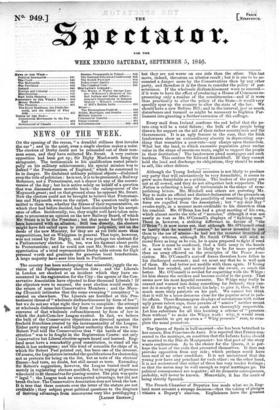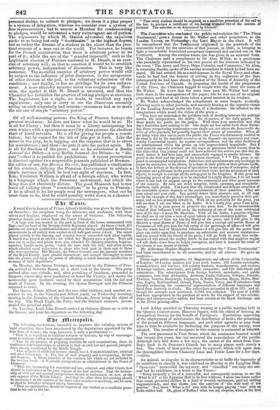The French Chamber of Deputies has made what we in
Eng- land must account a strange decision—that the taking of pledges vitiates a Deputy's election. Englishmen have the greatest
personal dislike to submit to pledges; we deem it a plan proper to a system of delegation, whereas we consider ours a system of free representation; but to unseat a Member for condescending to pledges, would be accounted a very extravagant act of purism. The arguments by which M. Guizot advocated the expulsion strike us as being not only doctrinaire " in the highest degree, but as rather the dreams of a student in the closet than the prac- tical reasons of a man out in the world. For instance, he boasts for the French constitution that there is arbitrary power in no part of it; while the use of the " mandat imperatif,' such as the Legitimist electors of Poitiers tendered to M. Drault, is an exer- cise of arbitrary will; so that to sanction it would be to establish arbitrary power, independent of discussion. This is very like nonsense. The so-called exercise of arbitrary power would still be subject to the influence of prior discussion, to the antagonism of other electors at the poll, to the voluntary submission of the candidate ; and finally, it has no privilege for its own enforce- ment. A more shadowy monster never was conjured up. How- ever, the upshot is that M. Drault is unseated, and that the Chamber has forbidden the practice of taking pledges at elections. The Legislature has a right, no doubt, to establish any such regulations ; only one is sorry to see the illustrious assembly acting on such singularly bad reasons—reasons so bad as to make the act one of simple "arbitrary power."



























 Previous page
Previous page